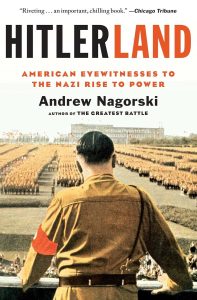Hitlerland
My first step when I begin a new book is what I think of as a self-directed masters’ program. Since I am inevitably writing about something outside my academic field, I read deep and wide.* It is a wonderful part of the process—one I share with you as I wrap my head around the big picture, stumble across great stories, and read fascinating books.
For some reason, I never told you about Andrew Nagorski’s Hitlerland: American Eyewitnesses to the Nazi Rise to Power, which was one of the first books I read as background material for writing The Dragon in Chicago. Actually, now that I think about it, Hitlerland was one of the first books I read as background material for writing my book proposal. I may not have shared it because I didn’t want to spill the beans about the book idea. Luckily it is never too late for a book review.
Nagorski, himself a foreign correspondent, opens Hitlerland with a two page synopsis of Sigrid Schultz’s life and career as the head of the Chicago Tribune’s Berlin bureau. He returns to Schultz on occasion as a touchstone, but he focuses on Americans whose experience of Nazi Germany was shorter and less informed that Schultz’s. He looks at accounts by Americans who worked or traveled in Germany in the 1920s and 1930s: diplomats, journalists, entertainers, scholars, students, and Olympic athletes. Not to mention Charles Lindbergh, whose visits in Germany between 1936 and 1939 at the invitation of the Nazi government were in some ways sui generis.
The final result is a startling picture of just how much Americans actually knew about what was happening in Germany, and how little many of them understood. It was relatively easy for Americans to travel to and in Germany in the years between the two world wars, and there was plenty of reason for them to do so. Berlin was a cultural hub that rivaled Paris in the 1920s, known as the “Golden Years.” But Nagorski makes it clear that many of them lived in relative isolation, spending time with other Americans. The result was a rosy view of Germany that led tourists and political junketeers to question the reality of the news reported by Sigrid Schultz and her colleagues.
An excellent introduction to a difficult subject.
*Actually, I do this when I write a researched-based article as well, though I try not to go quite as deep or as wide. Whenever I find myself slipping over the edge, I remind myself of what I think of as the Grange incident. (My apologies if you have heard this story before.) Early in my writing career, when I was pitching history-adjacent stories everywhere I could think of, I got an assignment to write an article on the history of the Grange** for Hobby Farms magazine. Newly out of my doctoral program, I plunged into a literature search. I soon began to panic at the amount of work I needed to do. Then I realized I had accumulated a list of 25 (very academic) books and articles as background pieces for a 250 word article.
**A national farming association founding in the mid-nineteenth century, the Grange was (and is) both a national lobby for the interests of small farmers and a community-based organization for farm families. In the past, Grange Halls were often the community centers in small rural towns. In short, the Grange was a Big Deal.
****
Just a reminder, The Dragon for Chicago is now available for preorder wherever you buy your books. If you want a signed copy, you can order it through my local independent bookstore here: https://www.semcoop.com/dragon-chicago-untold-story-american-reporter-nazi-germany Use the special instructions block at the bottom on the order page to request a signed copy and tell me how you want it signed.
Thanks to those of you who have already pre-ordered from any purveyor of books. It makes a difference.





